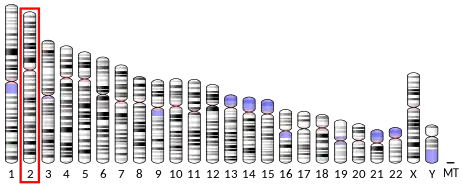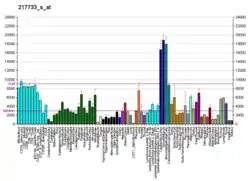TMSB10
Thymosin beta-10 is a protein that in humans is encoded by the TMSB10 gene.[3][4][5] TMSB10 is a member of the beta-thymosin family of peptides.
| TMSB10 | |||||||||||||||||||||||||||||||||||||||||||||||||||
|---|---|---|---|---|---|---|---|---|---|---|---|---|---|---|---|---|---|---|---|---|---|---|---|---|---|---|---|---|---|---|---|---|---|---|---|---|---|---|---|---|---|---|---|---|---|---|---|---|---|---|---|
| Identifiers | |||||||||||||||||||||||||||||||||||||||||||||||||||
| Aliases | TMSB10, MIG12, TB10, thymosin beta 10 | ||||||||||||||||||||||||||||||||||||||||||||||||||
| External IDs | OMIM: 188399 GeneCards: TMSB10 | ||||||||||||||||||||||||||||||||||||||||||||||||||
| |||||||||||||||||||||||||||||||||||||||||||||||||||
| |||||||||||||||||||||||||||||||||||||||||||||||||||
| |||||||||||||||||||||||||||||||||||||||||||||||||||
| |||||||||||||||||||||||||||||||||||||||||||||||||||
| Wikidata | |||||||||||||||||||||||||||||||||||||||||||||||||||
| |||||||||||||||||||||||||||||||||||||||||||||||||||
TMSB10 plays an important role in the organization of the cytoskeleton. Binds to and sequesters actin monomers (G actin) and therefore inhibits actin polymerization (By similarity).
References
- GRCh38: Ensembl release 89: ENSG00000034510 - Ensembl, May 2017
- "Human PubMed Reference:". National Center for Biotechnology Information, U.S. National Library of Medicine.
- McCreary V, Kartha S, Bell GI, Toback FG (Jun 1988). "Sequence of a human kidney cDNA clone encoding thymosin beta 10". Biochem Biophys Res Commun. 152 (2): 862–6. doi:10.1016/S0006-291X(88)80118-9. PMID 3365256.
- Santelli G, Califano D, Chiappetta G, Vento MT, Bartoli PC, Zullo F, Trapasso F, Viglietto G, Fusco A (Oct 1999). "Thymosin beta-10 gene overexpression is a general event in human carcinogenesis". Am J Pathol. 155 (3): 799–804. doi:10.1016/s0002-9440(10)65178-4. PMC 1866886. PMID 10487837.
- "Entrez Gene: TMSB10 thymosin, beta 10".
Further reading
- Tsitsiloni OE, Yialouris PP, Echner H, et al. (1992). "Evidence for the extranuclear localization of thymosins in thymus". Experientia. 48 (4): 398–402. doi:10.1007/BF01923441. PMID 1582498. S2CID 21585912.
- Condon MR, Hall AK (1992). "Expression of thymosin beta-4 and related genes in developing human brain". J. Mol. Neurosci. 3 (3): 165–70. doi:10.1007/BF02919408. PMID 1627460. S2CID 11646975.
- Lin SC, Morrison-Bogorad M (1992). "Cloning and characterization of a testis-specific thymosin beta 10 cDNA. Expression in post-meiotic male germ cells". J. Biol. Chem. 266 (34): 23347–53. doi:10.1016/S0021-9258(18)54503-8. PMID 1744129.
- Hall AK (1991). "Differential expression of thymosin genes in human tumors and in the developing human kidney". Int. J. Cancer. 48 (5): 672–7. doi:10.1002/ijc.2910480507. PMID 2071228. S2CID 20642010.
- Hall AK, Hempstead J, Morgan JI (1990). "Thymosin beta 10 levels in developing human brain and its regulation by retinoic acid in the HTB-10 neuroblastoma". Brain Res. Mol. Brain Res. 8 (2): 129–35. doi:10.1016/0169-328X(90)90057-K. PMID 2169566.
- Weterman MA, van Muijen GN, Ruiter DJ, Bloemers HP (1993). "Thymosin beta-10 expression in melanoma cell lines and melanocytic lesions: a new progression marker for human cutaneous melanoma". Int. J. Cancer. 53 (2): 278–84. doi:10.1002/ijc.2910530218. PMID 8425765. S2CID 45935594.
- Lapteva N, Ando Y, Nieda M, et al. (2001). "Profiling of genes expressed in human monocytes and monocyte-derived dendritic cells using cDNA expression array". Br. J. Haematol. 114 (1): 191–7. doi:10.1046/j.1365-2141.2001.02910.x. PMID 11472367. S2CID 29115214.
- Bani-Yaghoub M, Felker JM, Ozog MA, et al. (2002). "Array analysis of the genes regulated during neuronal differentiation of human embryonal cells". Biochem. Cell Biol. 79 (4): 387–98. doi:10.1139/bcb-79-4-387. PMID 11527208.
- Strausberg RL, Feingold EA, Grouse LH, et al. (2003). "Generation and initial analysis of more than 15,000 full-length human and mouse cDNA sequences". Proc. Natl. Acad. Sci. U.S.A. 99 (26): 16899–903. Bibcode:2002PNAS...9916899M. doi:10.1073/pnas.242603899. PMC 139241. PMID 12477932.
- Santelli G, Bartoli PC, Giuliano A, et al. (2003). "Thymosin beta-10 protein synthesis suppression reduces the growth of human thyroid carcinoma cells in semisolid medium". Thyroid. 12 (9): 765–72. doi:10.1089/105072502760339325. PMID 12481941.
- Johansson U, Olsson A, Gabrielsson S, et al. (2003). "Inflammatory mediators expressed in human islets of Langerhans: implications for islet transplantation". Biochem. Biophys. Res. Commun. 308 (3): 474–9. doi:10.1016/S0006-291X(03)01392-5. PMID 12914774.
- Rho SB, Chun T, Lee SH, et al. (2004). "The interaction between E-tropomodulin and thymosin beta-10 rescues tumor cells from thymosin beta-10 mediated apoptosis by restoring actin architecture". FEBS Lett. 557 (1–3): 57–63. doi:10.1016/S0014-5793(03)01438-8. PMID 14741341. S2CID 84342157.
- Chiappetta G, Pentimalli F, Monaco M, et al. (2005). "Thymosin beta-10 gene expression as a possible tool in diagnosis of thyroid neoplasias". Oncol. Rep. 12 (2): 239–43. doi:10.3892/or.12.2.239. PMID 15254683.
- Gerhard DS, Wagner L, Feingold EA, et al. (2004). "The status, quality, and expansion of the NIH full-length cDNA project: the Mammalian Gene Collection (MGC)". Genome Res. 14 (10B): 2121–7. doi:10.1101/gr.2596504. PMC 528928. PMID 15489334.
- Lee SH, Son MJ, Oh SH, et al. (2005). "Thymosin {beta}(10) inhibits angiogenesis and tumor growth by interfering with Ras function". Cancer Res. 65 (1): 137–48. doi:10.1158/0008-5472.137.65.1. PMID 15665289. S2CID 10722553.
- Rho SB, Lee KW, Chun T, et al. (2005). "The identification of apoptosis-related residues in human thymosin beta-10 by mutational analysis and computational modeling". J. Biol. Chem. 280 (40): 34003–7. doi:10.1074/jbc.M501629200. PMID 16012174.
- Maelan AE, Rasmussen TK, Larsson LI (2007). "Localization of thymosin beta10 in breast cancer cells: relationship to actin cytoskeletal remodeling and cell motility". Histochem. Cell Biol. 127 (1): 109–13. doi:10.1007/s00418-006-0208-z. PMID 16786322. S2CID 37856926.
- Kim SC, Sprung R, Chen Y, et al. (2006). "Substrate and functional diversity of lysine acetylation revealed by a proteomics survey". Mol. Cell. 23 (4): 607–18. doi:10.1016/j.molcel.2006.06.026. PMID 16916647.
This article is issued from Wikipedia. The text is licensed under Creative Commons - Attribution - Sharealike. Additional terms may apply for the media files.


